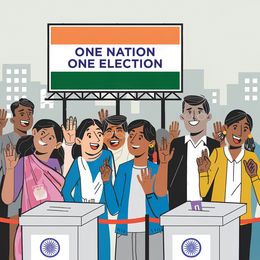Following the recommendations of a high-level committee led by former president Ram Nath Kovind to streamline the widely scattered schedule of national, state and local elections, the Union cabinet has reportedly approved two constitutional amendment bills for likely introduction in Parliament. Predictably, the return of the ‘one nation, one election’ issue to news has set off a flurry of objections by several opposition leaders.
The single most striking aspect of India’s continual elections cycle can be summed up in one phrase. It is that India has the lowest ratio of the time available for governance vis-a-vis the time demanded by campaigning. Simply stated, there is no other nation that compels its polity to devote anything close to such a vast amount of time to campaigning.
Instead, all other democracies allow their elected officials far more time to devote to governance, without continual engagement in campaigns for regional and local elections. Of course, this refers only to democracies, of whom India is not just the largest in the world, but also the largest ever in human history. Any comparison with non-democracies, which do not have to bother with elections in the first place, would be as irrelevant as comparing apples and oranges.
While assembly elections are ostensibly to determine the governments of states, the reality is that each and every one of them becomes a de facto referendum on national politics. Were that not so, there would not be such a frenzy after every assembly election about the strengthened legitimacy or the decreased moral authority of the party running the Union government.
Thus, the national polity, both those in government and opposition, gets dragged into each assembly election with disproportionate fervour. While this provides the opposition delightfully numerous occasions to hit back at those in government, it consumes vast amounts of the latter’s bandwidth away from the mandate they had received in the national elections.
Like other democracies, India, too, began the post-independence years with aligned assembly and parliamentary elections. But gradually these went out of synchronisation due to the premature termination or collapse of various state assemblies. This was an unintended consequence of India being the only large and diverse nation to have adopted the Westminster model of democracy.
It is high time we restored the governing to campaigning balance with which independent India began, and which is also the norm in other democracies. That is, the continuation of robust elections where the opposition is entitled to try and unseat the government. And a stable tenure for elected governments—at the Centre and states—to focus on governance in accordance with the mandates they receive.
It goes without saying that such a tenure would be subject to the governments continuing to enjoy a majority in Parliament and in assemblies. But it is also implicit that other than extenuating circumstances like a government losing its majority, our 1.4 billion citizens deserve and have a right to expect their elected representatives to devote their available bandwidth largely to implementing the mandate given to them for a particular tenure.
The opposition’s wish—and democracy’s requirement—to have checks and balances on elected governments must come about from a variety of other means and not via continual elections. Those should include vigorous participation in Parliament in place of the disruptions and grandstanding that have become common. And constructive grassroots movements in place of the hugely disruptive bandhs and agitations that we inherited from the freedom movement against an unelected colonial raj. But that is a topic for another column.
Baijayant ‘Jay’ Panda is National Vice President of the BJP and is an MP in the Lok Sabha.


